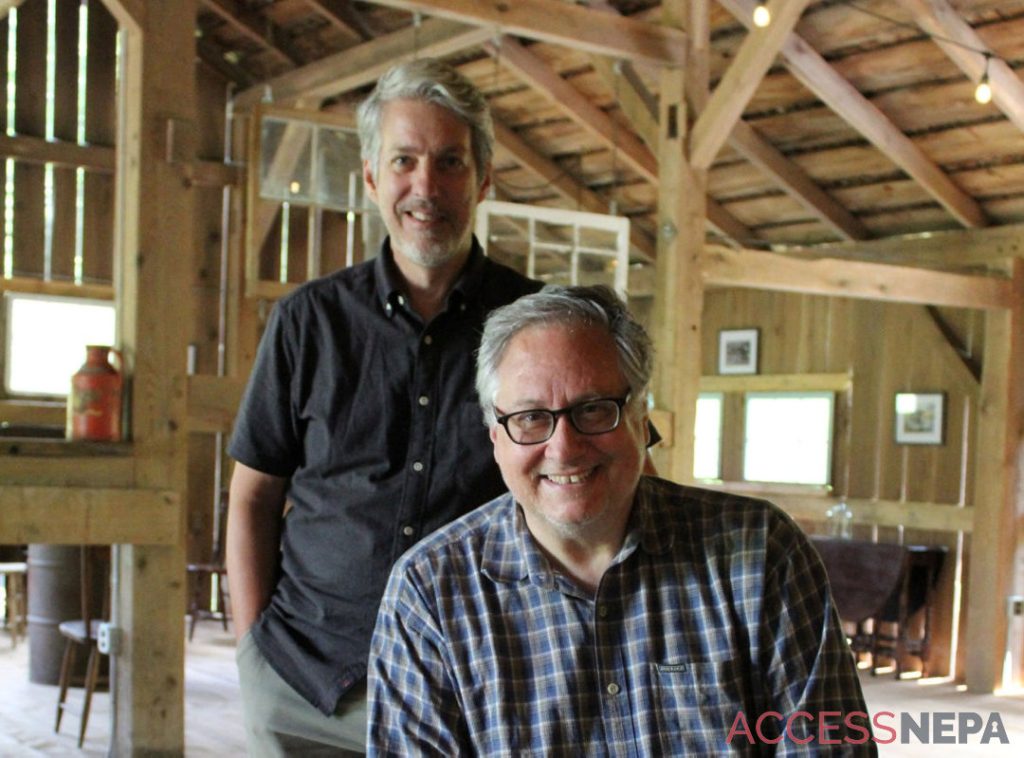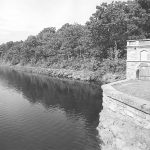BY ROBERT BAKER
When COVID-19 forced the lights to go out on Broadway in March 2020, five-time Tony-nominated playwright Douglas Carter Beane and composer Lewis Flinn concluded that the show must go on: At Lake Carey.
For more than a decade, the partners in life and collaborators on cutting-edge musicals had been making the town just north of Tunkhannock a place to get away from all of the glitz of the big city.
Beane had been coming to the lake since not long after his birth in Wilkes-Barre in 1959, and grew up with the same wide-eyed wonder of most kids who have the joy of discovering their grandparents were farmers and all that entails, with the backdrop of beautiful Lake Carey.
After his maternal grandfather, William Carter, died in 1966, farming stopped in the 1970s, and the barn just sat there.
Beane said he often remembered the barn as a scary place with very little lighting. He and his two sisters would dare each other to run into a certain location and run back out; the kid doing it the fastest would get candy at the marina.
Today, the barn is a friendly, rustic space, with lots of windows taken out of old farmhouses to let the natural light shine in. They hope the community will embrace it as a place to have weddings, craft shows, farm-to-table events, maybe even concerts and some dramatic plays.
The barn is actually three barns, Flinn said.
At bank level is the first barn, constructed around 1884, he said. About 100 feet toward the back is a lean-to addition that he estimates was done around 1898. And then, toward the lake, is the main dairy barn with silo that he believes was completed around 1911.
The barns are a walking history book. There’s Beane’s mother, Joan Carter’s, bicycle firmly attached to the wall. Beane tells of her not just riding around the lake, but using it to get to the Dietrich Theater a few miles away in Tunkhannock for a Saturday matinee.
There is also a wooden boat that has been preserved into something akin to a bookcase. In it is a photograph from the 1950s of Beane’s mom and dad, with an array of relatives on the lake, which gets Beane talking about his paternal grandfather having been an itinerant Methodist minister.
The craftsmanship that went into restoring the spaces of the barn is unmistakable. Beane noted that an architect friend visited recently and was in awe that there were no nails used for reinforcement. Some of the beams were replaced, but not in a way that would be apparent to the average visitor.
Flinn said that after a couple of unsatisfactory starts with others, the barn’s restoration was under the watchful eyes of John McNamara of Friendsville in Susquehanna County, whose son Tim McNamara lovingly embraced the timber/wood component. Stonemason John Maxey also helped restore a portion of the bank foundation and later did some work laying stone, where a cupola from the old Spring Grove Inn — which last summer was floated across the lake to a final resting place — has been preserved as a resting space.
Beane said that where the project moves depends on where the community has the desire and capacity to go.
“It is that tension of uncertainty in the midst of a pandemic that has made this enterprise a challenge,” Beane said.
The barn at 235 Shore Drive, Tunkhannock, had a wedding in early July and will host a Lake Carey Day craft show July 31. On Aug. 6, 7 and 8, there will be a preview of “Babes in Arms,” a remake done by Beane of the 1937 musical by Rodgers and Hart, which Mickey Rooney and Judy Garland later took to the big screen.
Contact the writer: bbaker@wcexaminer.com




